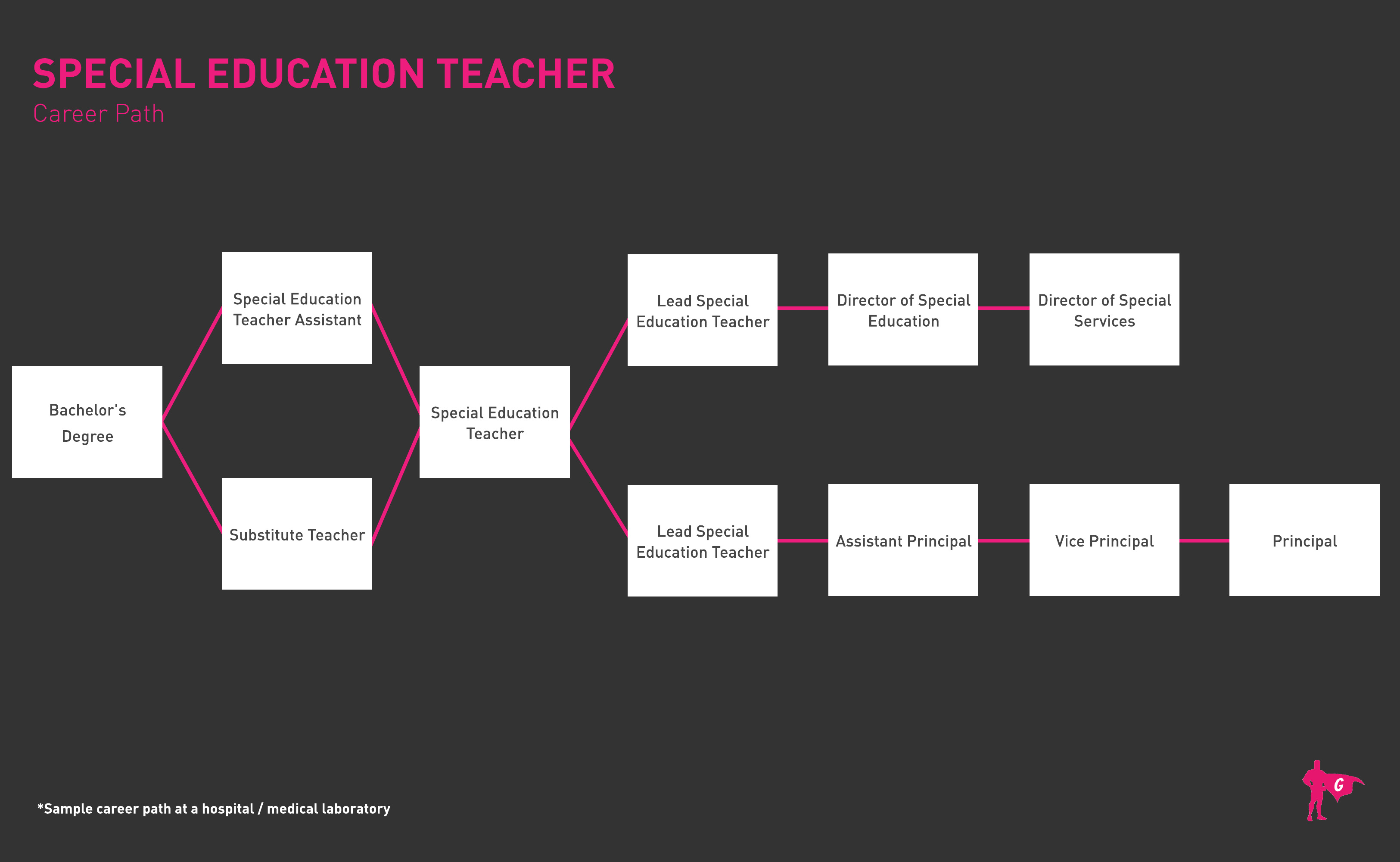Spotlights
Early Childhood Special Education Teacher (ECSE Teacher), Early Intervention Teacher, Exceptional Student Education Teacher (ESE Teacher), Handicapped Teacher, Preschool Special Education Teacher, Resource Teacher, Severe/Profound Mental Handicaps Special Education Teacher, Special Education Resource Teacher, Special Education Teacher, Teacher, Before/Afterschool Program Aide
For the 2020-21 school year, 7.2 million children aged 3-21 received special education services. That is equal to 15% of children in public schools. Therefore, it is essential to have capable Special Education Teachers who can teach and work with these students. A Special Education Teacher's responsibilities will vary by their students' needs, any specialties they might have, and their work settings.
Special Education Teachers work with students who have emotional, learning, mental, or physical disabilities. They help them develop study skills, adapt the learning environment to meet their needs, and may even assist them with daily tasks depending on their disability. They may teach in a resource room, an inclusive classroom, or both. Special Education Teachers also work with administration, general education teachers, parents, and specialists to develop and implement Individualized Education Programs (IEPs) for each student.
- Flexible curriculum and learning environment.
- You learn as much, if not more, from your students as they learn from you
- The pure joy of helping a student meet goals and reach their full potential
- Become a more compassionate and understanding person
Working Schedule
- Special Education Teachers generally work during school hours. They usually work ten months, with a two-month summer break and time off for holidays, including a winter break. If they teach at a school system that does a year-round school, they work for nine weeks with a three-week vacation. Some Special Education Teachers may work in hospitals or residential facilities or visit their students at home.
Typical Duties
- Coordinate the placement of special needs students into the general education classroom
- Develop and implement IEPs for each student
- Develop and implement strategies to help meet the basic needs of students with severe handicapping conditions
- Discuss students' progress with parents, general education teachers, administrators, and counselors
- Ensure that general education teachers are providing appropriate accommodations and following the student's IEP
- Establish and enforce behavioral rules and policies, using behavior modification and positive reinforcement
- Help students transition from grade to grade and prepare them for the transition from school to life after graduation
- Meet with parents, guardians, other teachers, and administrators to resolve any academic or behavioral problems
- Meet with parents and guardians to evaluate student's progress
- Modify gen-ed curriculum to meet the student's needs
- Observe and evaluate student's academic performance, behavior, social development, and physical health
- Plan and supervise class projects, guest speakers, and field trips
- Prepare, administer, and grade assignments and tests
- Provide additional instruction to students in vocational areas as needed
- Teach students personal development skills like independence and goal setting
- Update IEPs throughout the school year to show students' progress
- Supervise teacher assistants who work with special needs students
Additional Responsibilities
- Advise parents and guardians on community resources and skills to better assist their child
- Attend professional development meetings, conferences, and training workshops
- Attend staff meetings and perform administrative duties such as cafeteria and hall monitoring or bus loading and unloading
- Counsel students who have academic problems, adjustment issues, and special academic interests
- Help teach students living skills to prepare them for independent living, such as food preparation and hygiene
- Tutor students with sensory impairments
Soft Skills
- Active Learning
- Active Listening
- Communication
- Coordination
- Critical Thinking
- Decision Making
- Instructing Others
- Negotiation
- Persuasion
- Perceive and Understand Social Cues
- Problem Solving
- Reading Comprehension
- Resource Management
- Service Orientation
- Time Management
- Writing
Technical Skills
- Cloud-based sharing software (SharePoint)
- Computer training software (Padlet, Schoology)
- Database query software (Blackboard)
- Electronic Mail Software
- Multimedia educational software (Seesaw)
- Presentation software (Google Slides, PowerPoint)
- Project management (Google classroom)
- Video creation and editing (Flipgrid)
- Voice recognition software
- Word processing software (Microsoft Word)
- Public schools
- Private schools
- Residential facilities
- Hospitals
- Homes
Special Education Teachers who work for school systems usually work school hours for ten months with holidays and school breaks off. However, they might have to schedule meetings or attend training and development or staff meetings after school. They may also hold additional responsibilities at the school. Special Education teachers who work in other areas like hospitals or student homes get to work outside the school building but likely have to travel a lot.
The work of a Special Education Teacher can be challenging but also rewarding. They benefit from a more flexible schedule and curriculum than general education teachers. However, most times, they are responsible for adapting the existing curriculum to meet the needs of their students. Special Education Teachers have a lot of responsibilities. Still, they get to work more one-on-one with students than in a traditional classroom and help those students achieve academic and personal goals.
The job growth for Special Education Teachers in the coming years is excellent. This career is growing at a rate of 8%, with an average of 38,600 job openings each year over the next decade. Special Education Teachers working with preschool-age children are even more in demand, with a predicted growth rate of 12% over the next few years.
Jobs are increasing in demand in this field as more students with disabilities are being identified at younger ages. Increased student enrollment and special education funding will also impact growth in this job field.
Working as a Special Education Teacher requires a lot of compassion, empathy, and patience. Individuals in this job field have probably always shown these traits and would go above and beyond to meet the needs of others. They were most likely the students that would share their lunch with the student who didn't have anything to eat, sit with the new kid at lunch, and not tolerate bullying of special needs kids or any bullying.
- The minimum education requirement for Special Education Teachers is a Bachelor's degree in Education, preferably in Special Education
- Students can also major in an Educational field such as Math or English and minor in Special Education
- According to ONet, 47% of Special Education Teachers have a Master's degree, 41% have a Bachelor's degree, and 12% have a post-secondary certificate.
- Public schools require state certification or licensure for all teaching positions, but private schools do not
- Must have a Bachelor's degree to earn certification
- Must pass a background check
- Complete student teaching
- Pass a general teaching certification test
- Training typically includes education and student teaching; no additional training is required
- Experienced Special Education Teachers may become mentors to Teacher Assistants and new Special Education Teachers
- If you're unable to find work immediately after graduation, working as a Special Education Paraprofessional or a Teacher Assistant first to gain experience is a wise choice
- Special Education Teachers may eventually become Counselors, Instructional Coordinators, and Principals
- There are over 900 colleges in the United States that offer Special Education degrees
- Make sure that the school is accredited by the National Council for Accreditation of Teacher Education (NCATE)
- The school should have several options for student teaching, including placement at public and private schools
- Research schools that have high job placement rates in Special Education
- Consider getting an undergraduate degree in Special Education and a graduate degree in Education, or vice versa, to broaden your career choices
- Once you have obtained an undergraduate degree, look for schools that offer online Master's degree programs in Special Education
O*Net Online has a tool that can help you find Special Education Teacher training programs, certifications, and apprenticeships by state. Scroll down to the Training & Credentials section and enter your state to look for training and certification programs.
U.S. News has an extensive list of colleges that offer Special Education degree programs. College Factual looked at over 700 schools providing Special Education Teacher degree programs and ranked the top 100 with several honorable mentions.
- Study hard and do your best in all of your general education courses, including Math, Science, and English
- If you can, try to get a position as a classroom helper, particularly with special needs students
- Tutor other students, preferably those with special needs, if you can
- Volunteer at a children's hospital
- Take Psychology courses that will be beneficial to your career, such as Educational Psychology, Adolescent Psychology, and Social Psychology

- Earn a Bachelor's degree in Special or General Education from an accredited university. A graduate degree is optional but might be required in some states
- Complete your student teaching requirement
- If you're unable to find work immediately after graduation, apply for a job as a Special Education Paraprofessional or Teacher Assistant to gain experience
- Work as a Substitute Teacher
- Review the Praxis or other certification testing requirements for your state, and take the exam
- Create a professional resume that highlights your skills and experience
- Ask an editor or a friend to review your resume for mistakes or ways to improve it
- Let people in your network know when you start your job search
- Research potential employers before you interview with them
- The National Association of Special Education Teachers (NASET) has detailed job listings for Special Education Teacher positions in all states, as well as remote positions
- Search school district websites for job openings
- Offer mentorship to new teachers and teacher assistants
- Set goals for your career path and stick to them. For example, if your goal is to become a Counselor or Administrator, know the positions you will have to hold to work up to that title
- Ask your supervisors for any advanced training or courses you can take to expand your knowledge and skill set
- Ask a lot of questions and remain open to learning more
- Don't be afraid to learn and try new strategies and techniques
- Consider jobs that still involve education or special education, including Behavior Analyst or Instructional Coordinator
Websites
- American Academy of Special Education Professionals
- American Association on Intellectual and Developmental Disabilities
- American Federation of Teachers (AFT)
- American Speech-Language-Hearing Association
- Council of Administrators of Special Education
- Council for Exceptional Children
- Council for Learning Disabilities
- Education Commission of the States
- International Association of Special Education (IASE)
- LD Online
- National Association of State Directors of Special Education
- National Education Association (NEA)
- Teach.org
- TeacherVision
Books
- A Survival Guide for New Special Educators by Mary T. Brownell
- A Teacher's Guide to Special Education by David F. Bateman
- The IEP from A to Z: How to Create Meaningful and Measurable Goals and Objectives by Diane Twachtman-Cullen
While job growth for Special Education Teachers looks excellent for the coming years, you may still decide to change to a similar profession or to take a break from your busy work environment. If you want to explore other options, check out related occupations listed by Career One Stop and O*Net Online:
- Adapted Physical Education Specialists
- Career and Technical Education Teachers
- Childcare Workers
- Elementary, Middle, and High School Principals
- English as Second Language Instructors
- High School Teachers
- Instructional Coordinators
- Kindergarten and Elementary School Teachers
- Middle School Teachers
- Occupational Therapists
- Preschool Teachers
- Recreational Therapists
- Social Workers
- Teacher Assistants
- Tutors
Newsfeed

Featured Jobs

Online Courses and Tools







